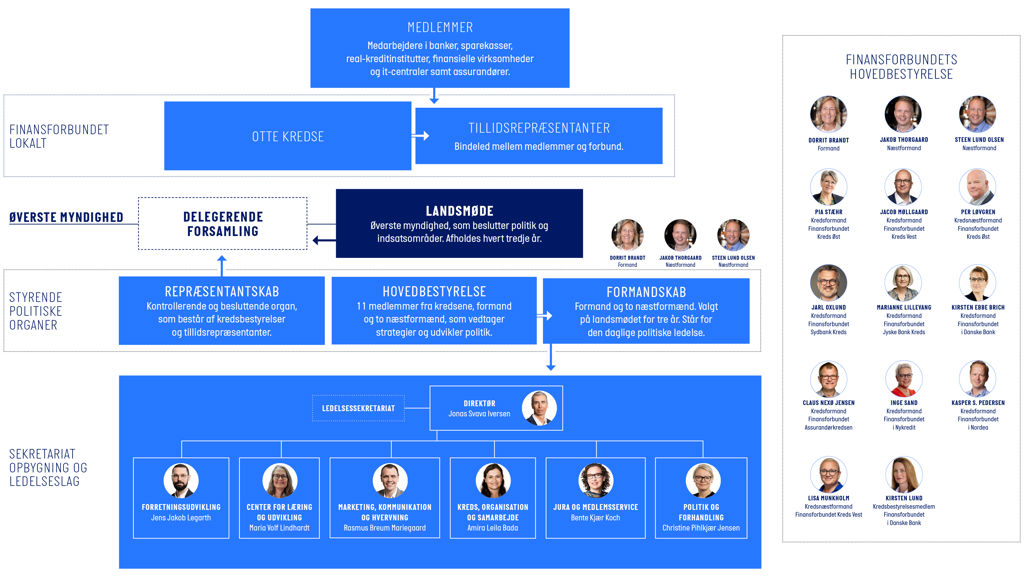A Breakdown of Finansforbundet as an Organisation
Finansforbundet (Financial Services Union Denmark) is made up of a secretariat, eight local branches and over 1,000 delegates. Our National Congress is the authority at the top of our organisation, and it is here that our focus areas and policies are decided – with the political leadership of the Assembly of representatives, Executive Committee and Presidency conducted between the National Congresses.
Here at Finansforbundet, we have around 1,000 union representatives, health and safety representatives and contact persons, who are distributed across the entire country. Around 130 are employed at the secretariat in Copenhagen, whereas the local branch offices around Denmark serve members and delegates locally.
We are an organisation for all employee groups within the financial sector – whether the cleaning assistant in the local branch or the dealer at head office. In other words, employees and managers at banks, savings banks, building societies, brokerage firms, leasing and finance companies, finance sector data centres and the enterprises jointly owned by the sector.

Union representatives are the backbone of any trade union, and Finansforbundet is no different. They are the linchpins between members and Finansforbundet, and members' main point of contact with Finansforbundet.
The local branch of the union is the member's main point of contact with Finansforbundet after the union representative. We have a total of nine local branches - six of which are company unions; the other three are financial unions. If companies have more than 1,200 members, they form a company union, whereas members in smaller companies are affiliated with local financial unions.
Every local branch has a Local Branch Executive Committee, which is elected by the branch's members at a General Assembly. Individual local branches can enter into local agreements regarding, for example, remote working, new types of wages, flexitime or jobs with special terms and conditions. In most cases, however, the collective agreement will establish some kind of general framework, with which the local agreements must comply.
If there are any problems related to the collective agreement, as a starting point these should be resolved at a local level in the workplace and in the individual local union. If the case is of fundamental importance or the situation reaches an impasse, the local branch can involve Finansforbundet's secretariat. Members may, however, always go directly to Finansforbundet's secretariat should they so choose.
The Executive Committee consists of 12 members appointed by the local branches, and of one President and two Vice-Presidents, who are elected at the National Congress. The Executive Committee implements strategies within the focus areas decided by the National Congress.
The Presidency consists of one President and two Vice-Presidents, who take care of the day-to-day political leadership of Finansforbundet. The Presidency is elected for a three-year period at the National Congress.
In the period between the National Congresses, the Assembly of representatives acts as the advisory and inspection body for the Executive Committee. A meeting is held once a year during the National Congress period.
The Assembly of representatives is made up of members from Finansforbundet's Local Branch Executive Committees.
The National Congress is the authority at the top of our Finansforbundet organisation, deciding on focus areas and policies for us to work on in the time up to the next National Congress. It is also the National Congress that elects Finansforbundet's Presidency.
We hold a National Congress every three years.
The Statutes are the regulatory basis and framework for Finansforbundet. Only the National Congress may amend the statutes.
Contact us
32 96 46 00You are welcome to call us Monday to Thursday from 8.30-16.00 and Friday from 8.30-15.00.
You can also send an e-mail to post@finansforbundet.dk







